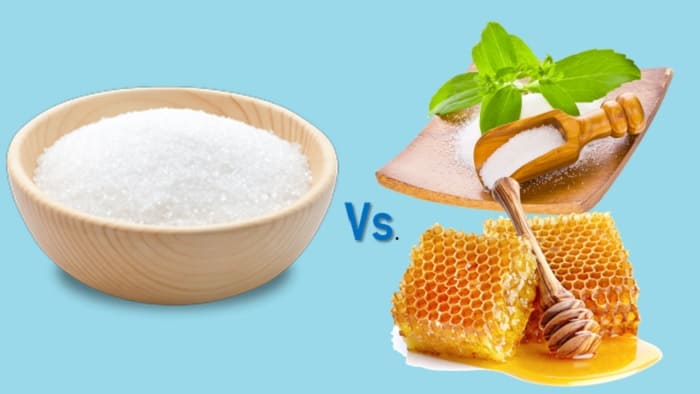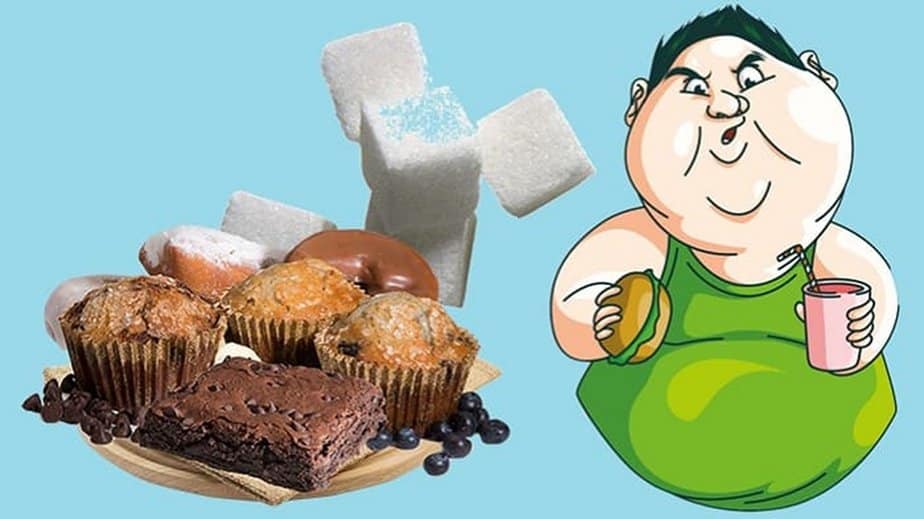High sugar consumption has become the largest reason for diabetes, obesity, and heart disease.
‘Added sugar’ is one of our daily diet’s most harmful food ingredients.
Our body’s natural sugar from grains and other carbs always comes with nutrients, minerals, and fiber.
But the added sugar we consume contains only empty calories that adversely affect metabolism and other vital functions of our body.
Regular and excess consumption of edibles like sweetened soft drinks, juices, snacks, cookies, and processed foods harms our bodies.
Beyond moderation, any sweetened food or drink is bad for health as they contain a lot of added sugar.
Now a question arises, “How much sugar per day is healthy and safe?”
This article will discuss this and other important matters related to ‘sugar consumption and health.’
Uncontrolled Sugar Consumption Is On The Rise
A large number of people all over the world are sugar addicts. Sweetened processed foods and beverages are the most commonly consumed foods by most of us.
According to one of the analysis data published in 2008, the US people (on average per head) consume 60 pounds of sugar per year. The daily intake of sugar per person in the US is about 306 calories or 19 teaspoons of sugar.
Consuming more than 300 calories of sugar per day is quite a big amount that can cause disease in most people over time.
Most cases of type II diabetes, heart ailments, tooth decay, non-alcoholic fatty liver, certain cancers, and many more are caused by excess sugar intake.
As we become increasingly aware of sugar’s dangers, most of us are making conscious efforts to reduce the consumption of sweetened beverages and foods.
Added Sugar V/s Natural Sugar

Sugar (as a carbohydrate variant) is naturally present in most foods like vegetables, milk, fruits, and grains that we regularly consume.
However, the percentage of sugar per calorie present in these foods and natural sweeteners is comparatively less, and they also contain water, fiber, vitamins, and minerals. The sugar contained in these foods is not harmful to the body.
Added sugar is any sweetener that is added to processed foods and beverages while they are being made.
Corn syrups, brown sugar, cane sugar, malt syrup, maple syrup, molasses, and table sugar are common types of added sugar used in various processed foods and beverages.
The added sugar is very high in calories and contains no vitamins and nutrients. It is mostly the ‘added sugar’ that leads to high blood sugar levels and the many diseases arising from it.
However, moderate added sugar consumption may not cause major health issues in most people.
How Much Sugar Per Day Is Safe To Consume?
It is a very difficult question to answer as each person’s body reacts differently to sugar levels in the body.
Some people can eat a lot of sugar and remain healthy, but for others, even a little amount of regular sugar consumption can cause disease.
The American Heart Association (AHA) recommendations on daily sugar consumption could be the safest suggestion we can rely upon.
AHA Recommendation:
- Men: 150 calories per day (9 teaspoons/37.5 grams)
- Women: 100 calories per day (6 teaspoons/25 grams)
Most people exceed the daily healthy sugar consumption limit recommended by the AHA.
For example, when you drink 12oz (355 ml) of Coca-Cola, it contains 39 grams of sugar, adding about 140 calories to your body. Another popular beverage, ‘Red Bull Energy Drink,’ 250ml (8.3oz), contains 27 grams of sugar, adding 108 calories to your body.
As a general guideline, limiting added sugar consumption between 90 to 150 calories per day is always good. This will keep you healthy and active without becoming obese.
If you can completely avoid the added sugar, it is the best choice you can make for your better health. Added sugar has NO health benefits at all.
Is It Safe For Obese People To Consume Sugar?
‘People who live in glass houses shouldn’t throw stones.’ This proverb can very well be used to summarize the health condition of an obese person.
Obese people, already at the highest risk of bad health, should try to avoid added sugar consumption altogether.
Added sugar does not benefit health but will only aggravate the obesity condition.
Those already having a lot of sugar-sweetened food daily try to eliminate this habit as early as possible.
If you are fatty and overweight, strictly avoid sweetened food items like beverages, processed and baked foods, and candies.
For obese people, it is always better to have whole-grain, vegetables, and protein-rich foods than sugary foods.
Overcoming Sugar Addiction
Just like substance abuse, sugar addiction is also a difficult habit to overcome. The brain likes to be stimulated by the sweet taste.
I have encountered many people who literally cannot stop gorging on sweetened snacks and beverages. It is almost irresistible to say NO to them…they have the continuous urge to eat it whenever possible.
The first step to getting rid of this bad food habit is to become aware of the habit and be conscious of the bad effects of sugar on health.
Have a well-planned healthy diet plan and meticulously follow the same. Don’t even entertain the thought of having sweetened foods in your mind.
Try to develop a feeling of hatred towards these foods as you know they are harmful to your health.
A few weeks of a conscious effort to abstain from sugary foods and drinks will help you stay away from them for life.
What All Sugary Foods Should You Avoid?
Unfortunately, the most commonly used beverages and processed food contain added sugar.
We have grown up from childhood with such foods as a major part of our daily diet. It is really hard to avoid them suddenly.
Here are some of the most commonly used sweetened food items you should forgo for good.
- Fruit juices, especially canned ones, are sweetened with fructose syrups or sugar.
- All sweetened beverages (including soda) are bad for health as they contain a lot of added sugar that is very high in calories.
- Baked foods like cakes, cookies, and biscuits are highly processed foods with very high sugar; avoid them as much as possible.
- All kinds of sweets and candies are really bad for consumption.
- Dried fruits are also avoidable as they are naturally rich in sugar and often have an extra sugar coating.
- Dairy products without fat are usually high in sugar and are not so healthy for regular consumption.
It is always good to prepare foods that do not need sugar as an ingredient. Try substituting the sugar in recipes with natural flavoring ingredients like almond milk, vanilla, lemon, ginger, or nutmeg.
The use of natural calorie-free sugar like Stevia is a good substitute for harmful sugars.
You should consciously drink more water and avoid all sweetened beverages like soda and Coke.
Another best way to avoid sugar is to replace all your favorite processed foods and snacks with fresh fruits, soups, or nuts.
Final Thought
Added sugar is the most commonly used ingredient in most processed food items we eat today. Excess-added sugar consumption is the main reason for many major diseases today.
A lot of sugar may not be so bad for young people, but most people above thirty could quickly develop major diseases with daily consumption of little extra sugar.
It is important to be aware of your health condition before you decide to eat any food containing added sugar.
Prevention is the best cure…you need not wait to get a serious disease like diabetes or heart issues to stop consuming sugar.
